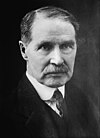Anderson Montague-Barlow
Sir Clement Anderson Montague-Barlow, 1st Baronet, KBE (28 February 1868 – 31 May 1951) was an English barrister and Conservative Party politician.
He was born Clement Anderson Barlow at St Bartholomew's Vicarage, Clifton, Gloucestershire, and preferred to be known under his second name, Anderson, rather than his first, Clement. He received a Master's degree and an LL.D. from the University of Cambridge and practiced at the bar. Between 1910 and 1923 he represented Salford South in the House of Commons. In 1922 he was admitted to the Privy Council upon becoming Minister of Labour, a position he served in until 1924. He was made a Knight Commander of the Most Excellent Order of the British Empire in 1918 and in 1924 he was created a baronet, of Westminster in the County of London.
In 1938, Neville Chamberlain's government asked Barlow to chair a royal commission into the urban concentration of population and industry, "The Royal Commission on the Distribution of the Industrial Population", which became known as the Barlow Commission.[1] Its report, published in 1940, raised the problem of large towns as a public issue for the first time, and concluded that "planned decentralisation" was favourable. The report was largely ignored at the time, as it came shortly after the outbreak of World War II, but its conclusions were a major factor behind the new towns movement after the war, which lead to the creation of 27 new towns.
In 1946 Barlow changed his last name to Montague-Barlow.[2][3]
Montague-Barlow died in May 1951, aged 83, when the baronetcy became extinct.
See also
References
- ^ The National Archives: Royal Commission on the Distribution of the Industrial Population (Barlow Commission): Minutes and Papers Linked 2015-05-30
- ^ Hansard 1803-2005, Mr Anderson Barlow. Alternative names: Anderson Montague-Barlow 1946 – 1951 Linked 2015-05-30
- ^ A Guide to the Papers of British Cabinet Ministers 1900-1964, Sir (Clement) Anderson Montague-Barlow, Bt (1868–1951) Linked 2015-05-30
External links
- Hansard 1803–2005: contributions in Parliament by Mr Anderson Barlow
- Royal Commission on the Distribution of the Industrial Population (Barlow Commission).
- Leigh Rayment's list of baronets
- Leigh Rayment's Historical List of MPs
- Use dmy dates from January 2012
- 1868 births
- 1951 deaths
- Conservative Party (UK) MPs
- Members of the Parliament of the United Kingdom for English constituencies
- Baronets in the Baronetage of the United Kingdom
- Knights Commander of the Order of the British Empire
- Members of the Privy Council of the United Kingdom
- UK MPs 1910–18
- UK MPs 1918–22
- UK MPs 1922–23
- Members of London County Council
- Municipal Reform Party politicians
- Conservative MP (UK), 1860s birth stubs

